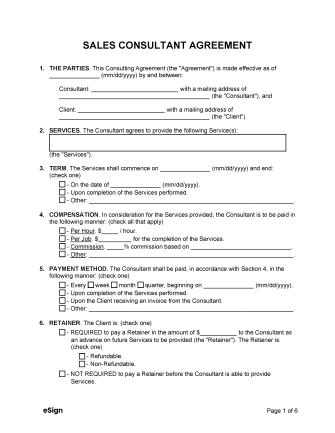

A sales consulting agreement is used by businesses to hire sales experts to work independently on improving company profits. The completed contract will describe the consultant’s responsibilities, how long they will have to complete the work, and the amount they will be paid. Consultants are usually paid an hourly rate; however, they may also be paid a flat fee and will often be given a guaranteed retainer.
A sales consultant is an independent contractor whose job is to improve their clients’ sales by implementing marketing strategies, training sales teams, streamlining business processes, and increasing brand awareness. The consultant will need to be well-versed in their knowledge of company products, services, client base, and of the marketplace. After analyzing the company’s operations, the consultant can use their expertise and market familiarity to maximize company profits and foster new client relationships.
As an independent contractor, a sales consultant is responsible for declaring and paying taxes on their consulting income.
Sales consultants can operate in any field that sells a product or service including the automotive, medical, technological, food, and insurance industries. The role that the consultant plays will be relative to their specialization and the client’s needs. Below is a list of the different types of jobs for which a sales consultant may be hired.
An independent contractor that sells company products and services directly to customers, usually for a commission.
Responsible for training and managing a business’s sales teams. A sales coach will often be knowledgeable in the company’s product or service and can educate their employees to improve sales and better serve their clients.
Improves the communication and working dynamics between a company’s sales and marketing departments. This involves analyzing the company’s operations and providing reports and recommendations on how to make sales and marketing more effective.
A business sales consultant analyzes a company’s business operations and provides recommendations to increase sales profits.
Fosters and develops transactional relationships with other businesses. The consultant will often already work within their client’s market and is hired to use their existing connections to bring new customers.
Although there are no specific educational requirements t o becoming a sales consultant, a certificate in sales or business degree will greatly increase a candidate’s probability of finding work. Regardless of their education level, individuals will need to experience working in, training, and managing sales teams or marketing departments for successful companies. Once they have achieved adequate training and experience, an individual can either apply for a position at consulting firms or look for work as an independent contractor.
The terms of a sales consulting agreement are often negotiated prior to finalizing a contract. Once completed, the document will need to include the following information:
The identities of the hiring party and the consultant – The contract will need to provide the consultant and client’s names and addresses.
The services that the consultant will be paid to provide – A clear description of the services that the consultant is being hired for is vital to avoiding conflicts over the delivery of work.
The compensation that the consultant will be paid – The agreement must lay out the method and amount of payments. Consultants may charge clients by the hour, by project, commission, or on a weekly/monthly/quarterly basis.
The duration of the agreement – A consulting agreement will have a start date and will end on a set termination date or when services have been completed.
The retainer and contingency guaranteed by the hiring party (if applicable) – A retainer is a flat fee the consultant will be paid to guarantee future services. A contingency is a commission or other payment the consultant is guaranteed contingent to certain conditions.
A statement verifying the consultant’s independent contractor status – It is important that the agreement affirms the consultant’s non-employee status to avoid potential legal issues regarding the business relationship.
Both parties’ signatures – The contract must be signed and dated by both parties for it to be legally binding.